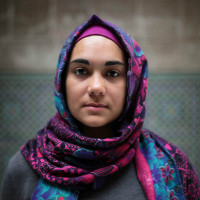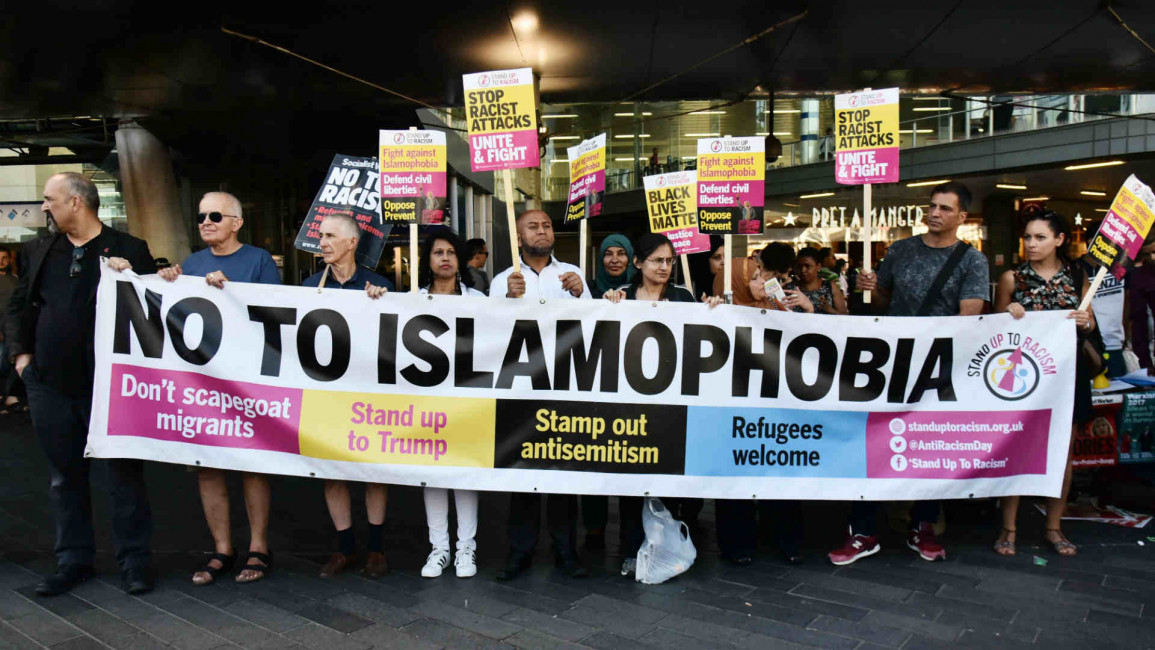
It's open season on Muslims, and Trumps tweets prove it
US President Donald Trump on Wednesday morning retweeted a number of posts by Jayda Fransen, deputy leader of the UK-based far-right group, Britain First.
Donald Trump's three retweets depicted supposed Muslims committing offences and implicitly blamed all Muslims or migrants for the crimes. No context or verification was given, nor was the religion of the victims mentioned, nor the fact that Muslims make up the majority of victims of terror.
But there should be nothing shocking about Trump's retweets; this is not his first Islamophobia rodeo.
Trump famously pledged in his election campaign to establish a "Muslim register", and spent months battling to implement the so-called Muslim ban which restricts admission to the US for travellers from six Muslim-majority countries.
Trump's retweeting of Fransen's posts should therefore come as no surprise, but they do underscore the increasingly emboldened and tolerated Islamophobia that has become entirely commonplace in the world today.
 |
It's fashionable to hate Muslims, because even the US president does |  |
The most baffling of President Trump's retweets of Jayda Fransen - who was recently charged with "threatening, abusive or insulting words or behaviour" - was that of a man speaking Arabic who breaks a statue of the Virgin Mary.
This can hardly be considered a crime worthy of the president's outrage in a society that preaches the freedom to mock and caricaturise religious figures as a cornerstone of democracy.
It's fashionable to hate Muslims, because even the US president does. In the past month alone there are scores of other such examples.
Read more: What British Twitter thinks of Britain First, Donald Trump's new favourite internet thing
This week The Daily Mail ended its contract with columnist Katie Hopkins, days after she gave an incendiary speech at the far-right American think-tank the David Horowitz Freedom Center. Hopkins called for the audience to arm themselves, to "get furious and fight back", while attacking Sadiq Khan, "the Muslim mayor of Londonistan", and claimed that areas in the UK were controlled by a "Muslim mafia".
Katie Hopkins has previously referred to migrants as "cockroaches" and "feral humans" and called for a "final solution" for Muslims in the wake of the Manchester bombing in May.
Former equalities chief Trevor Philips this week deemed the Islamophobia awards - an annual satirical event in the UK, organised by the Islamic Human Rights Commission - "genuinely dangerous" and stated that the label "painted a target on the back of people on the list", apparently oblivious - or indifferent to - the target that Islamophobia paints on its victims' backs.
A 24-year-old British man was sentenced to two years and three months in prison last week for attempting to locate and stab a Muslim passer-by, and electronics company Huawei faced a backlash and calls for boycott in China for a phone feature that reminded Muslims of prayer times and could direct them to the nearest mosque.
Last weekend, Martin Strid delivered a speech at the Sweden Democrats' national conference, stating that Muslims were "not completely human". The local politician later resigned over his comments, which stated that even former Muslims did not qualify as a member of the species.
"On one end of the scale you are 100 percent human, a person, everything that's part of that concept. At the other end, you are 100 percent Mohammedan," he said.
Comment: Trump's retweet madness
Earlier this month, UK school regulator Ofsted announced plans to quiz primary school girls in hijab, and white powder was delivered to a Manchester mosque, trapping dozens of children inside while emergency services dealt with the threat.
The result of the perpetual flurry of Islamophobic normalisation is that ordinary Muslims are trapped in the role of aggressor and it becomes very hard to imagine a Muslim victim.
 |
It is exemplified in the expression of Muslims not doing enough to combat terrorism, or when we are photographed in the aftermath of an attack not looking sufficiently traumatised |  |
This is exemplified though the lack of international response to the ethnic cleansing of the Rohingya Muslims, and the refusal of politicians to put pressure on Aung San Suu Kyi, State Counsellor of Myanmar.
It is exemplified with the case of Hadiya, a Muslim convert from Hinduism, who had her marriage to a Muslim annulled by the Supreme Court of India and who, this week, at 24 years old, has been placed under the custodianship of the dean of her college.
Her father and the courts suspect her of converting under duress and have refused to allow her to live with her husband.
It is exemplified in the expression of Muslims not doing enough to combat terrorism, or when we are photographed in the aftermath of an attack not looking sufficiently traumatised.
When commentary on politics, terrorism, or society is examined, Donald Trump's tweets are not surprising at all.
Britain First has called for the reinstatement of punitive hangings. It members have supported calls for a religious war in the UK. The group are notorious for forcing their way into mosques and for organising "Christian patrols".
Trump's tweets represent a clear trend of the selective outrage, sensationalism and right-wing inclinations that have been witnessed since the start of his presidency, from both within, and without, the White House.
Ruqaya Izzidien is a British-Iraqi freelance writer specializing in social and cultural affairs. Her work has been published in The New York Times, the Guardian, the BBC and Al Jazeera English, and her upcoming novel is entitled The Watermelon Boys.
Follow her on Twitter: @RuqayaIzzidien
Opinions expressed in this article remain those of the author and do not necessarily represent those of The New Arab, its editorial board or staff.




